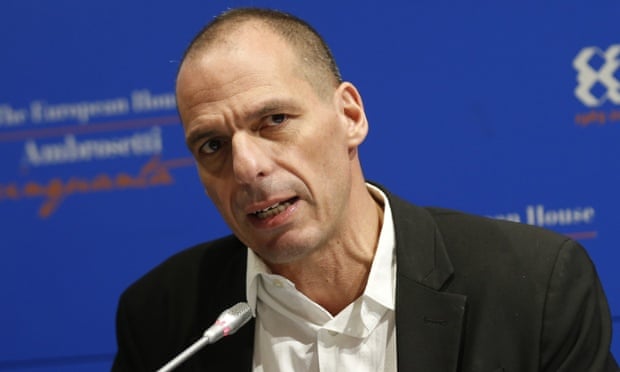Helena Smith in Athens Tuesday 17 March 2015
Tensions between two countries wound tighter after Wolfgang Schäuble launches verbal attack on Alexis Tsipras’s government
Wolfgang Schäuble, German finance minister, reiterated that Greece’s debt problems were caused by its living beyond its means. Photograph: Wiktor Dabkowski/Wiktor Dabkowski/dpa/Corbis

The war of words between Athens and Berlin intensified on Monday when the German finance minister Wolfgang Schäuble said Athens’s left-led administration had ruined the trust the country had regained with its European partners.
Schäuble also accused the prime minister, Alexis Tsipras, of mendacity and reiterated that Greece’s debt problems lay squarely with the fact that the Mediterranean nation had lived far beyond its means.

Alexis Tsipras invited to Berlin as Yanis Varoufakis denies giving Germany the finger
“The new Greek government has totally destroyed the trust of its European partners … this is a serious setback,” the veteran politician, widely seen as the architect of austerity, told a panel in Berlin. “Until November, Athens was on a road that could have lead it to exit the crisis. This has gone. I don’t know what to do now with Greece.”
The remarks, immediately decried as insults by the Greek media, came hours after the German chancellor Angela Merkel extended a personal invitation to her Greek counterpart to visit Berlin on 23 March. Tsipras, who she once derided as a troublemaker, immediately accepted with aides saying he would seek to strike a political solution at the talks.
Analysts described the meeting – hotly anticipated by a government catapulted to power barely two months ago on an agenda to dismantle “Merkelism” – as a potential “moment of truth” that could break the impasse in Greece’s ongoing battle to keep bankruptcy at bay.
Berlin, the biggest contributor to the €240bn (£160bn) bailout programme propping up the Greek economy, has said a further €7.2bn tranche of aid will only be released once Athens implements credible reforms.
With the cash-strapped government running on near-empty and facing debt repayments of €1.5bn by the end of the month fears of a credit crunch are mounting.
Greece’s finance minister, Yanis Varoufakis, speaking in Italy on 14 March. Photograph: Luca Bruno/AP
Tensions between the two countries have reached unparalleled heights in recent weeks with officials in both capitals lobbing rhetorical grenades.
Last week, Schäuble said the possibility of Greece exiting the euro could no longer “be ruled out” despite Merkel’s spokesman insisting that Athens’ place is in the Eurozone.
Surveys have shown Germans growing increasingly frustrated with Greeks. A poll published on March 13 by the public broadcaster ZDF found 52% of respondents (up from 41% a month earlier) no longer wanted Greece to remain in the single currency.
About 80% said they did not think the new Greek government was “behaving seriously toward its European partners”. Athens’s flamboyant finance minister, Yanis Varoufakis, raised tensions further when he was forced to publicly deny he had “given the finger” to Germany during a videoed talk given more than two years ago.

German anger over Greek demand for war reparations
Berlin incredulous at justice minister’s threat to seize German property and repatriate antiquities unless €341bn compensation is paid
Late on Monday, the Greek defence minister, Panos Kammenos, added to the pressure, claiming that German politicians were “against Athens” because it had raised the uncomfortable issue of reparations for Nazi atrocities committed during the second world war. Kammenos, who heads the coalition government’s junior partner, the right-wing Independent Greeks party, has said Berlin is waging a “psychological war” against Greece with the purpose of ejecting it from the Eurozone.
The bitter exchanges were exacerbated by enraged international inspectors from the EU and IMF complaining that the Tsipras government was failing to provide adequate protection as they visited Athens to audit public finances.
The anti-austerity coalition has refused to allow the technical teams to visit state buildings, instead insisting that they carry out the audit in hotels. Local media have photographed the inspectors – part of the deeply unpopular “troika” now rebranded the Brussels Group – being driven to subterranean garages in hotels where Greek officials have reportedly handed them government accounts.
German finance minister accuses Athens of destroying trust | Business | The Guardian
![The [Greek] European Tragedy](https://blogger.googleusercontent.com/img/b/R29vZ2xl/AVvXsEiWKI5s90SFm1wWTk6bs4p7CgslaC2SnYPsrZhb-B-smOufNNCSxCvpBLI9hOB-LsXZjir_PNmEiMk2-E62F3xkg96IoC6QFAaZAnPRTVH340IN9WBRmWJqPkjWlgyRj3zpALp7h6hvA58/s920/GkBack_new.jpg)
